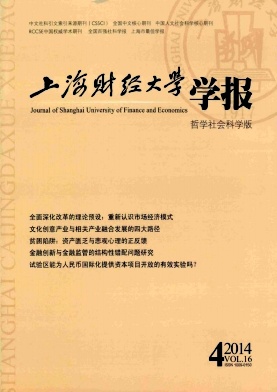贫困陷阱:资产匮乏与悲观心理的正反馈
上海财经大学学报 2014 年 第 16 卷第 04 期, 页码:44 - 53
摘要
参考文献
摘要
主流经济学关于贫困问题的研究主要关注物质层面的贫困,忽略了物质贫困状态下形成的心理贫困,遗漏了心理因素与经济因素相互作用这一重要机制。文章将贫困主体的悲观心理引入贫困研究中,分析悲观心理对贫困主体选择行为的影响及与收入(资产)反馈机制,以揭示贫困发生机理、发生条件以及脱贫的对策。文章的一个重要结论是,贫困陷阱的资产门槛不是一个刚性的界限,而是一个弹性的区间,其可变范围取决于行为主体的悲观心理状态。
[1]徐维东,吴明证,邱扶东.自尊与主观幸福感关系研究[J].心理科学,2005,(3).
[2]叶初升,刘亚飞,高考.贫困陷阱的微观机制与实证研究述评[J].经济学家,2012,(4).
[3]Andersen S.Exiting Unemployment:How Do Program Effects Depend on Individual Coping Strategies[J].Journal of Economic Psychology,2011,32:248-258.
[4]Bandura A.Self Efficacy:The Exercise of Control[M].New York:Freeman,1997.
[5]Banerjee A.,Mullainathan S.Climbing Out of Poverty:Long Term Decisions Under Income Stress[C].In 11th BREAD Conference on Development Economics,London 2007,October:5-6.
[6]Banerjee A.,Mullainathan S.Limited Attention and Income Distribution[J].The American Economic Review,2008,98(2):489-493.
[7]Barnett B.,Barrett C.,Skees J.Poverty Traps and Index-based Risk Transfer Products[J].World Development,2008,36(10):1766-1785.
[8]Barrett C.,Carter M.The Economics of Poverty Traps and Persistent Poverty:Empirical and Policy Implications[J].The Journal of Development Studies,2013,49(7):976-990.
[9]Bertrand M.,Mullainathan S.,Shafir E.A Behavioral-economics View of Poverty[J].The American Economic Review,2004,94(2),419-423.
[10]Brown P.Dowry and Intrahousehold Bargaining Evidence from China[J].Journal of Human Resources,2009,44(1):25-46.
[11]Cardenas J.,Carpenter J.Behavioural Development Economics:Lessons from Field Labs in The Developing World[J].The Journal of Development Studies,2008,44(3):311-338.
[12]Carter M.,Lybbert T.Consumption Versus Asset Smoothing:Testing The Implications of Poverty Trap Theory in Burkina Faso[J].Journal of Development Economics,2012,99(2):255-264.
[13]Dickinson D.,Oxoby R.Cognitive Dissonance,Pessimism,and Behavioral Spillover Effects[J].Journal of Economic Psychology,2011,32(3):295-306.
[14]Hall C.Decisions Under Poverty:A Behavioral Perspective on The Decision Making of the Poor[D].Doctoral Dissertation,Princeton University,2008.
[15]Janzen S.,Carter M.After the Drought:The Impact of Microinsurance on Consumption Smoothing and Asset Protection[R].National Bureau of Economic Research,2013.
[16]Lyubomirsky S.,King L.,Diener E.The Benefits of Frequent Positive Affect:Does Happiness Lead to Success[J].Psychological Bulletin,2005,131(6):803-855.
[17]Quisumbing A.,Baulch B.Assets and Poverty Traps in Rural Bangladesh[R].Chronic Poverty Research Centre Working Paper,2009.
[18]Schindler K.,Giesbert L.Assets,Shocks and Poverty Traps in Rural Mozambique[C].World Bank Conference:Employment and Development,2010.
[19]Spears D.Economic Decision-making in Poverty Depletes Behavioral Control[R].Center for Economic Policy Studies,Princeton University,2010.
[20]Wolters C.,Yu S.,Pintrich P.The Relation Between Goal Orientation and Students’Motivational Beliefs and Self-regulated Learning[J].Learning and Individual Differences,1996,8(3):211-238.
[21]Yesuf M.,Bluffstone R.A.Poverty,Risk Aversion,and Path Dependence in Low-income Countries:Experimental Evidence from Ethiopia[J].American Journal of Agricultural Economics,2009,91(4):1022-1037.
[22]Zimmerman F.,Carter M.Asset Smoothing,Consumption Smoothing and The Reproduction of Inequality under Risk and Subsistence Constraints[J].Journal of Development Economics,2003,71(2):233-260.
[2]叶初升,刘亚飞,高考.贫困陷阱的微观机制与实证研究述评[J].经济学家,2012,(4).
[3]Andersen S.Exiting Unemployment:How Do Program Effects Depend on Individual Coping Strategies[J].Journal of Economic Psychology,2011,32:248-258.
[4]Bandura A.Self Efficacy:The Exercise of Control[M].New York:Freeman,1997.
[5]Banerjee A.,Mullainathan S.Climbing Out of Poverty:Long Term Decisions Under Income Stress[C].In 11th BREAD Conference on Development Economics,London 2007,October:5-6.
[6]Banerjee A.,Mullainathan S.Limited Attention and Income Distribution[J].The American Economic Review,2008,98(2):489-493.
[7]Barnett B.,Barrett C.,Skees J.Poverty Traps and Index-based Risk Transfer Products[J].World Development,2008,36(10):1766-1785.
[8]Barrett C.,Carter M.The Economics of Poverty Traps and Persistent Poverty:Empirical and Policy Implications[J].The Journal of Development Studies,2013,49(7):976-990.
[9]Bertrand M.,Mullainathan S.,Shafir E.A Behavioral-economics View of Poverty[J].The American Economic Review,2004,94(2),419-423.
[10]Brown P.Dowry and Intrahousehold Bargaining Evidence from China[J].Journal of Human Resources,2009,44(1):25-46.
[11]Cardenas J.,Carpenter J.Behavioural Development Economics:Lessons from Field Labs in The Developing World[J].The Journal of Development Studies,2008,44(3):311-338.
[12]Carter M.,Lybbert T.Consumption Versus Asset Smoothing:Testing The Implications of Poverty Trap Theory in Burkina Faso[J].Journal of Development Economics,2012,99(2):255-264.
[13]Dickinson D.,Oxoby R.Cognitive Dissonance,Pessimism,and Behavioral Spillover Effects[J].Journal of Economic Psychology,2011,32(3):295-306.
[14]Hall C.Decisions Under Poverty:A Behavioral Perspective on The Decision Making of the Poor[D].Doctoral Dissertation,Princeton University,2008.
[15]Janzen S.,Carter M.After the Drought:The Impact of Microinsurance on Consumption Smoothing and Asset Protection[R].National Bureau of Economic Research,2013.
[16]Lyubomirsky S.,King L.,Diener E.The Benefits of Frequent Positive Affect:Does Happiness Lead to Success[J].Psychological Bulletin,2005,131(6):803-855.
[17]Quisumbing A.,Baulch B.Assets and Poverty Traps in Rural Bangladesh[R].Chronic Poverty Research Centre Working Paper,2009.
[18]Schindler K.,Giesbert L.Assets,Shocks and Poverty Traps in Rural Mozambique[C].World Bank Conference:Employment and Development,2010.
[19]Spears D.Economic Decision-making in Poverty Depletes Behavioral Control[R].Center for Economic Policy Studies,Princeton University,2010.
[20]Wolters C.,Yu S.,Pintrich P.The Relation Between Goal Orientation and Students’Motivational Beliefs and Self-regulated Learning[J].Learning and Individual Differences,1996,8(3):211-238.
[21]Yesuf M.,Bluffstone R.A.Poverty,Risk Aversion,and Path Dependence in Low-income Countries:Experimental Evidence from Ethiopia[J].American Journal of Agricultural Economics,2009,91(4):1022-1037.
[22]Zimmerman F.,Carter M.Asset Smoothing,Consumption Smoothing and The Reproduction of Inequality under Risk and Subsistence Constraints[J].Journal of Development Economics,2003,71(2):233-260.
引用本文
叶初升, 高考, 刘亚飞. 贫困陷阱:资产匮乏与悲观心理的正反馈[J]. 上海财经大学学报, 2014, 16(4): 44–53.
导出参考文献,格式为:





 6481
6481  229
229

